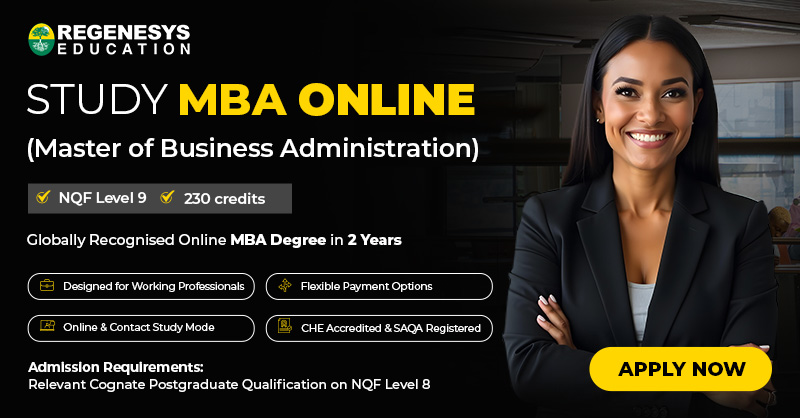The Master of Business Administration (MBA) is a globally recognised qualification designed to develop leaders, managers, and entrepreneurs capable of making strategic decisions and driving organisational success.
At Regenesys, the MBA programme is a two-year, NQF Level 9 qualification that combines flexible study modes with rigorous academic content.
This article highlights the leadership skills, MBA admission requirements, and showcases career opportunities, demonstrating how the Regenesys MBA prepares leaders for impactful roles in South Africa and beyond.
Table of Contents

The 7 Essential Leadership Skills You Will Gain in an MBA
Leadership skills are the cornerstone of any MBA, shaping graduates into professionals who can influence teams, make strategic decisions, and drive innovation. While business knowledge is essential, employers increasingly value leadership competencies that translate into real-world impact. The MBA experience develops these skills through practical learning, case studies, and collaborative projects.
These are the seven essential leadership skills you will gain in an MBA:
1. Strategic Thinking and Decision-Making
In a complex business environment, the ability to think strategically is a vital leadership skill. MBA graduates are trained to assess challenges, anticipate future trends, and make informed decisions that align with organisational objectives. The MBA programme emphasises case studies and real-world business scenarios, equipping students with practical tools for effective decision-making.
These are the aspects of strategic thinking developed in an MBA:
- Analytical skills: Develop the ability to evaluate complex data sets, identify meaningful patterns, and make sound, evidence-based decisions that guide business performance.
- Strategic and long-term planning: Gain expertise in assessing the broader implications of managerial decisions and crafting plans that support sustainable organisational growth.
- Risk awareness and problem anticipation: Build the capacity to recognise potential risks early and design proactive strategies to mitigate or prevent them.
2. Effective Communication
Leadership requires the ability to convey ideas clearly and influence others. MBA programmes focus on enhancing communication skills, enabling graduates to articulate effective strategies, present insightful ideas, and effectively engage stakeholders.
The main communication skills honed in the MBA include:
- Presentation skills: Learn to design and deliver compelling, data-driven presentations tailored to executives, clients, and cross-functional teams.
- Negotiation and persuasion: Acquire techniques to influence decisions effectively and reach mutually beneficial agreements in diverse business contexts.
- Active listening and stakeholder engagement: Develop the ability to understand stakeholder perspectives, interpret underlying needs, and respond with thoughtful, informed solutions.
3. Team Leadership
An MBA shapes you into a leader who can bring people together and extract the best from them. You’ll learn how to manage diverse teams, handle challenges, and create an environment where collaboration thrives.
Authentic leadership is not about giving orders; it’s about inspiring, motivating, and empowering people to work toward shared goals. With these skills, you’ll be ready to lead teams with confidence, even in complex and high-pressure situations.
The elements of team leadership include:
- Delegation and Empowerment: Through case studies, group projects, and leadership simulations, the MBA teaches you to assign responsibilities effectively based on team members’ strengths, while empowering them to take ownership and excel in their roles.
- Conflict Resolution: MBA coursework and collaborative exercises provide opportunities to navigate disagreements constructively, equipping you with the tools to manage conflicts and maintain a positive, productive team environment.
- Motivation and Engagement: Through leadership modules, mentorship experiences, and organisational behaviour studies, you learn strategies to inspire and engage colleagues, keeping teams committed, motivated, and aligned with organisational goals.
4. Critical Thinking and Problem-Solving
In business environments, leaders must analyse challenges from multiple perspectives and develop practical solutions. The MBA strengthens critical thinking by exposing students to real-world scenarios that require logical reasoning and innovative problem-solving.
Essential aspects of critical thinking and problem-solving include:
- Analytical Evaluation: Through data analysis exercises and strategic projects, the MBA enables you to examine complex situations, facilitating informed and effective decision-making thoroughly.
- Creative Solutions: MBA coursework encourages innovation and problem-solving, allowing you to think outside the box and develop original solutions for organisational challenges.
- Decision Implementation: By working on real-world projects and simulations, you learn to execute decisions confidently, while assessing outcomes and adjusting strategies for maximum impact.
5. Emotional Intelligence and Self-Awareness
Effective leadership extends beyond technical expertise; it requires self-awareness and the ability to manage relationships with others. The MBA cultivates emotional intelligence, helping students to become self-aware, empathetic, and adept at navigating interpersonal dynamics in professional settings.
Below are the aspects of emotional intelligence and self-awareness, including:
- Self-Reflection: Through personal development exercises, leadership assessments, and feedback sessions, the MBA helps you identify your strengths and areas for growth, enhancing your overall leadership effectiveness.
- Empathy: Through MBA coursework, group projects, and stakeholder simulations, you learn to understand and appreciate diverse perspectives, enabling you to respond thoughtfully to the needs of team members, clients, and stakeholders.
- Relationship Management: By collaborating on team projects and engaging in networking opportunities, you develop the skills to build trust and maintain positive professional relationships, even in high-pressure or challenging situations.
6. Ethical Leadership and Corporate Governance
Integrity and ethical decision-making are critical for sustainable success. MBA graduates learn to uphold ethical standards while making strategic decisions, ensuring accountability and responsible governance.
The elements of ethical leadership include:
- Integrity in Decision-Making: MBA helps you prioritise fairness and transparency, ensuring your business decisions are responsible and principled.
- Corporate Governance Awareness: MBA coursework exposes you to regulatory frameworks, compliance practices, and organisational policies, enabling you to understand and apply governance standards in real-world business settings.
- Social Responsibility: By engaging in projects, simulations, and discussions on sustainable business practices, you develop the skills to make informed decisions that positively impact employees, communities, and stakeholders, ultimately fostering ethical and socially responsible leadership.
7. Adaptability and Change Management
The modern business landscape is constantly evolving, and leaders must be agile to navigate change effectively. The MBA graduates are expected to embrace uncertainty, manage transitions, and implement strategies that respond to shifting market and organisational demands.
Aspects of adaptability and change management include:
- Flexibility: MBA modules challenge you with real organisational scenarios and leadership exercises, helping you adapt your approach to meet the diverse needs of different teams and business needs.
- Change Implementation: By leading projects that involve process improvements and organisational transformations, you gain practical experience in guiding teams through change smoothly and effectively.
- Resilience: High-pressure assignments, collaborative challenges, and leadership reflections within the MBA programme teach you to stay composed, maintain performance, and motivate your team during challenging situations.
Also read, How to Solve a Case Study in MBA: Strategies Every Student Needs

MBA Career Paths With Regenesys
The CHE-accredited Regenesys Master of Business Administration equips graduates with the 7 essential leadership skills, opening doors to diverse and rewarding career opportunities. Graduates are prepared to assume senior management roles, strategic positions, or entrepreneurial ventures across various industries.
These are the key career paths and advantages of pursuing an MBA at Regenesys:
- Management Consultant: Guide organisations on strategy and efficiency. Regenesys provides practical case studies and mentorship to sharpen analytical and problem-solving skills.
- Chief Executive Officer(CEO): Lead organisations and drive long-term growth. The MBA’s leadership modules develop confidence, strategic thinking, and ethical decision-making.
- Senior Executive or Manager: Oversee teams and implement business strategies. Regenesys emphasises real-world applications to ensure graduates are workplace-ready.
- Director of Business: Shape organisational vision. Exposure to global business trends and management best practices enhances strategic foresight and insight.
- Global Business Manager: Manage international operations. Flexible study modes and diverse peer groups at Regenesys broaden cultural understanding and collaboration skills.
- Entrepreneur: Launch and manage innovative ventures. Practical learning, mentorship, and networking opportunities equip graduates to succeed in competitive markets.
Also read the article, MBA Motivation Letter Guide: Structure, Examples, and Writing Tips
Conclusion
The Regenesys Master of Business Administration (MBA) equips graduates with the essential leadership skills needed to succeed in today’s dynamic business environment. From strategic thinking and effective communication to ethical leadership and adaptability, the programme blends rigorous academic content with practical learning, mentorship, and collaborative projects.
Graduates emerge ready to take on senior management roles, entrepreneurial ventures, or global business opportunities, with the confidence to make informed decisions, lead teams, and drive organisational success. By choosing the Regenesys MBA, learners gain not only knowledge but also practical experience, industry exposure, and a professional network that accelerates career growth.
Take the next step in shaping your leadership journey and explore how Regenesys Education can prepare you for impactful roles across industries in South Africa and beyond.

Essential Leadership Skills Gained from an MBA Programme – FAQ
What is the duration of the Regenesys MBA?
The MBA is a two-year postgraduate programme, offering 230 credits and flexible study modes including contact and online learning.
What are the admission requirements for the MBA?
Applicants need a relevant cognate postgraduate qualification at NQF Level 8, relevant work experience, basic computer skills, and competency in English.
Can professionals without management experience apply?
Yes. While work experience strengthens your application, the programme evaluates candidates based on academic qualifications and potential for leadership growth.
What career opportunities does an MBA offer?
Graduates can pursue roles such as CEO, management consultant, senior executive, business director, global business manager, or entrepreneur.
Can I study the MBA online?
Absolutely. The programme offers flexible online learning options to accommodate working professionals and international students.







